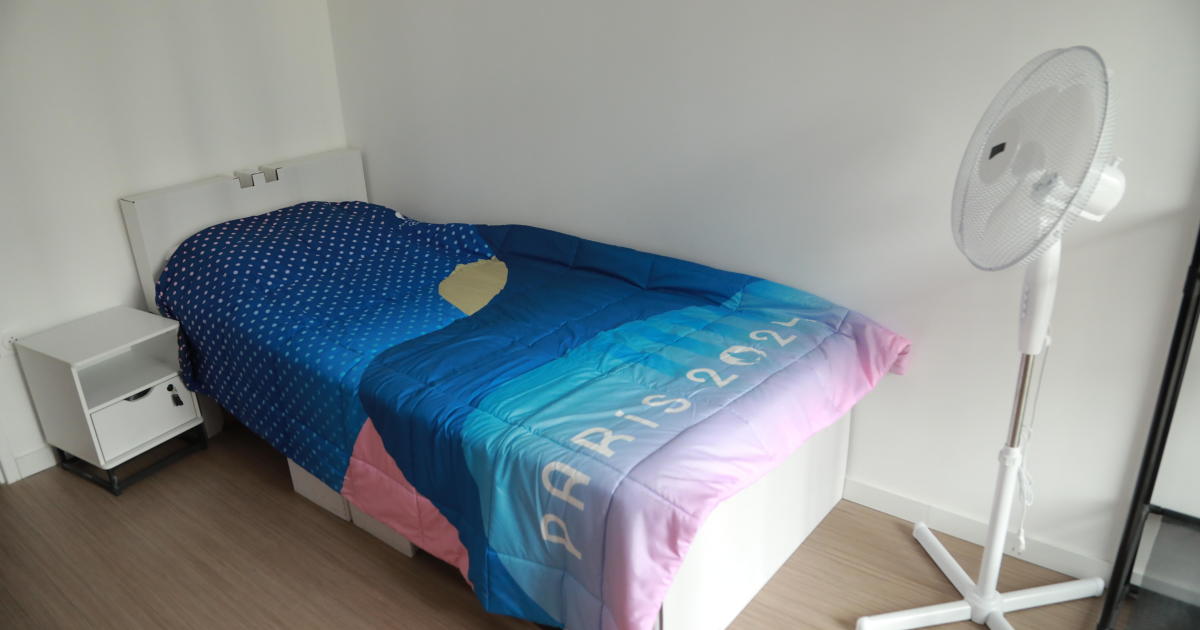The highly anticipated Paris Olympics are set to begin this year, and athletes are making their final preparations to compete at the highest level. One crucial element of athletic performance is getting enough rest and recovering effectively. This is where the infamous cardboard beds in the Olympic Village come into play, and they’re not without their share of controversy.
Athletes Voice Concerns About Uncomfortable Cardboard Beds
The “anti-sex” cardboard beds, initially introduced for sustainability at the Tokyo Games in 2020, have sparked much debate, especially with regard to their comfort. Athletes have taken to social media to express their concerns about the firmness of the beds and how it impacts their sleep. Australian water poloist Tilly Kearns, for example, posted a video showcasing the stiffness of the bed, describing it as “rock solid.” Kearns also highlighted the lack of comfort despite the mattress featuring a customizable firmness level. Olympian Simone Biles echoed Kearns’ sentiment, confirming the bed’s discomfort and mentioning plans for mattress toppers to improve sleeping conditions.
Impact of Sleep on Athletic Performance
Dr. Carlos M. Nunez, a sleep expert and chief medical officer at medical device company ResMed, underscores the critical importance of sleep for optimal athletic performance. “For everyone, sleep is critically important – it’s one of the three pillars of health: sleep, diet, and exercise,” Nunez states. “You can imagine, not just the average person, but an elite athlete, an Olympic-level athlete, those three pillars of health, it’s sort of what they live by…the way they work out and the way they recover, including sleep, it’s critical for them.”
Mattress Firmness and Adjustment Period
While a firm mattress can have its advantages for certain sleepers, transitioning to a new bed often requires an adjustment period. “Anytime you change firmness, up, down, or whatever, there can be an adjustment period that could lead to things like little backaches and aches and pains, and disruption in your sleep,” explains Nunez. “It may be an amazing, great, expensive mattress, but my body may just be used to a different firmness level, and it may take time.” This implies that athletes experiencing sleep disruption due to the beds might find relief with mattress toppers or simply adjusting to the new sleeping surface.
Additional Challenges for Athletes’ Sleep: Heat and Noise
Aside from the firmness of the mattresses, athletes face additional obstacles that can disrupt their sleep and potentially affect their performance in the Paris Olympics. The intense heat anticipated for the games is a major concern. While there’s a preference for cooler sleeping temperatures, the Olympic Village in Paris will not be equipped with air conditioning, leading to uncomfortable and potentially detrimental sleeping conditions for the athletes.
Heat’s Impact on Sleep and Performance
“The heat could be potentially more important, actually, than the discomfort they might deal with the mattresses,” notes Nunez. He highlights that optimal sleep environments generally involve cooler temperatures. “A hot summer, a muggy summer especially, and dealing with a mattress that might be uncomfortable to you, you could see athletes, who rely on sleep as an important part of their training, struggle with those two things.”
Noise Pollution from Air Conditioning Units
Adding to the sleep disturbance is the use of portable air conditioning units by many athletes, particularly Team USA, who are bringing their own units for their rooms. While helpful for managing heat, these units often produce noise, further compromising the quietness required for restful sleep. Nunez mentions that the noise levels from portable air conditioning units might not be as silent as central air conditioning units. “A portable AC unit is probably not as quiet as a central AC unit, so there’s also the noise to consider,” he warns. The constant hum from these units could interfere with the athletes’ sleep, despite the heat mitigation.
Take Away Points
The Paris Olympics are poised to be challenging for athletes in more ways than one. From the potentially disruptive firmness of the beds to the high heat anticipated in the city, the athletes are facing substantial obstacles to achieving optimal rest and recovery, which are critical components of their athletic success. It’s a testament to the dedication of these individuals that they continue to train diligently and overcome adversity in pursuit of Olympic glory. While the organization and logistics of the Olympic Village raise important questions about the prioritization of athletes’ well-being, their dedication to excellence is expected to shine through, despite these challenges.




